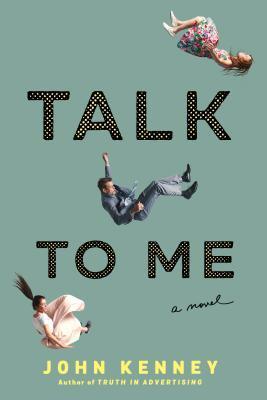So right off, I’ll say that I loved John Kenney’s *Truth in Advertising more. There was everything inside of that one, it was a book that made you laugh out loud, cry, and have great big feelings. Talk to Me is not as funny, indeed there really are no laugh out loud moments at all as I don’t think it’s meant to be written with humour. This is more a scathing commentary on our lives today and the great big gigantic soul sucking mess today’s news and social media has brought upon us. It is dark, sarcastic and highly critical of how unhappy and fake we seem to have become. It uses broadcast news with Ted Grayson at its centre and social media and .dot com journalism as its lens to show how news is no longer news, but gossipy garbage meant only to bring about retweets and clicks. Everything we watch comes attached with ads to view before seeing the gossipy junk. There is nary a funny moment within and I felt as though much of this was a millennial-blaming rant.
Kenney’s opinion on .com journalism is abundantly clear: “…in the former mixing and baking rooms of the National Biscuit Company, sit the impossibly hip offices of scheisse.com…Now, within the exposed brick walls hundreds of nearly identical-looking people in their twenties and thirties, from fine universities, posted their own kind of sustenance to the masses, an endless feed of insipid online drivel, a kind of visual and verbal vomit, under the guise of journalism.” “And above it all, the scheisse mantra: NO RULES. JUST CLICKS.” “The stories on scheisse were the result of research that in some cases took almost thirty minutes, based, often, on reading something on another website and repackaging it….Bylines claimed that twenty-six-year-olds with two months of writing experience were “senior political correspondents”, though most would be hard-pressed to tell you the meaning of the word “gerrymander”.”
“Because what you didn’t understand wasn’t the mission. The mission wasn’t to inform. The mission was to sell to advertisers. Click, friend, at your own peril.”
“….the end of network news, of course. News as entertainment. The vaunted anchorman now a relic of a bygone era, a long time ago when people actually cared about you said.”
There is a lot of grey area inside too as to how we’re supposed to feel about Ted Grayson. I wondered if this was written to be a big whine about the imposed upon downfall of the rich, white man and his increasing irrelevance in today’s society. Poor Ted? His wife left him for someone else, his daughter hates him, he’s not able to keep a solid erection – his downfall comes about from his yelling obscenities at the make-up girl but we’re to feel sorry for him because (what? we’re expected to believe this is his first outburst? Not true, it’s just this kind of behaviour was tolerated before) he just wants to be loved but left alone and expect everyone around him to adjust to his moods and needs? And when they don’t he lashes out but it’s not really his fault? It’s the fault of these damn millennials and their posting everything online? (If it weren’t for those meddling teenagers Scooby!)
“He was, and had been for a goodly portion of the past twenty years of his life, the center of things. If he was in a room he was the focus of attention.”
“How does a man’s life come to this, to this place?”
Overall, while I agree our consumption of news, or what we deem newsworthy today is sorely lacking, Talk to Me came across as more of a rant and perhaps Kenney trying to get the reader to feel badly for Ted and that it’s really not his fault he’s out of touch, growing older and no one has tolerance anymore in this day for his crap? I maybe can understand the stance Kenney was going with here – that maybe everyone was just a little too harsh on Ted, but that’s where this grey matter area comes in when thinking about Talk to Me in its overall sense. (If that is making any sense.)

(*this review for Truth in Advertising was written by our former Hoarder Jackie)

